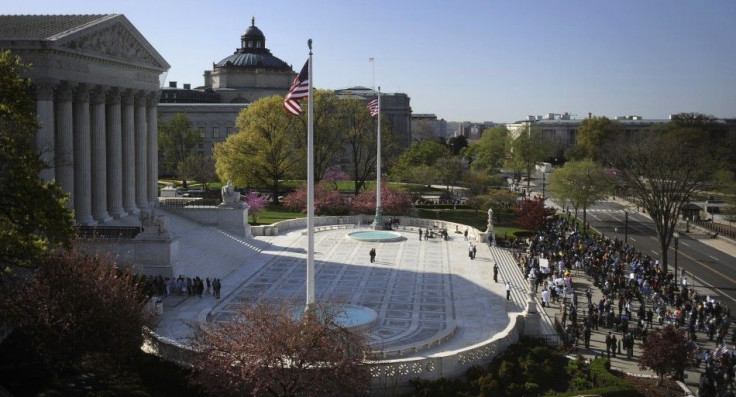Health Care Case: Conservative Justices Question Medicaid Expansion; Scalia Sees Robbery

WASHINGTON -- The expansion of Medicaid was supposed to be among the least controversial parts of the Affordable Care Act, so court-watchers were taken aback Wednesday when the justices decided to weigh its constitutionality.
Under the Obama health care law, the eligibility guidelines for Medicaid would be increased and the federal government would cover states' cost of covering new enrollees, though eventually decreasing its share to 90 percent in 10 years.
But if states refused, they would get kicked out of the entire Medicaid program, not just the funding dedicated for new beneficiaries. The threat of losing funds has loomed over the states in most expansions of Medicaid since President Lyndon B. Johnson enacted the program nearly 50 years ago, though some steps have been voluntary.
But this expansion President Barack Obama signed into law may have crossed the threshold.
His chief Supreme Court lawyer, Solicitor General Donald Verrilli, said the Medicaid provision still gives states a choice: Take it or leave it.
But Justice Antonin Scalia characterized it as a stickup.
You've been given an offer you can't refuse ... 'Your money or your life,' he said.
The arguments sharply divided the court's conservative and liberal wings, with the Republican-appointed majority leaning toward ruling that the Medicaid expansion crossed the line by compelling states to care for new enrollees.
The conservative justices hammered Verrilli, arguing for the administration, to accept that the sheer size of Medicaid puts states in a bind over whether to accept the money.
Chief Justice John Roberts latched onto a row between Arizona and the White House when the state wanted to pull out of a Medicaid program for children. Such a move by Arizona could have cost the state $7 billion in federal funding.
If I had the authority and I was in that position, I would use it all the time, Roberts said. You want some little change made? Well, guess what; I can take away all your money if you don't make it. I win. Every time. It seems that that would be the case.
There were efforts to paint the expansion as a boon for states, with Verrilli calling it an extremely generous offer. But for Roberts, that undercut the government's argument.
If it's such a good deal, he asked, why do you need the club?
The potential fallout from a decision striking down the Medicaid expansion was articulated when Justice Sonia Sotomayor said the federal government's hands would be tied when it tried to address a national -- and expensive -- problem like insuring the poor.
She directly challenged Paul Clement, the lawyer arguing against the law, on his assertion that the Medicaid provision is too large, thus making any threat of pulling funds unconstitutionally coercive.
We're going to tie the hands of the federal government in choosing how to structure a cooperative relationship with the states, she said. We're going to say to the federal government, the bigger the problem, the less your powers are. Because once you give that much money, you can't structure the program the way you want.
© Copyright IBTimes 2024. All rights reserved.





















